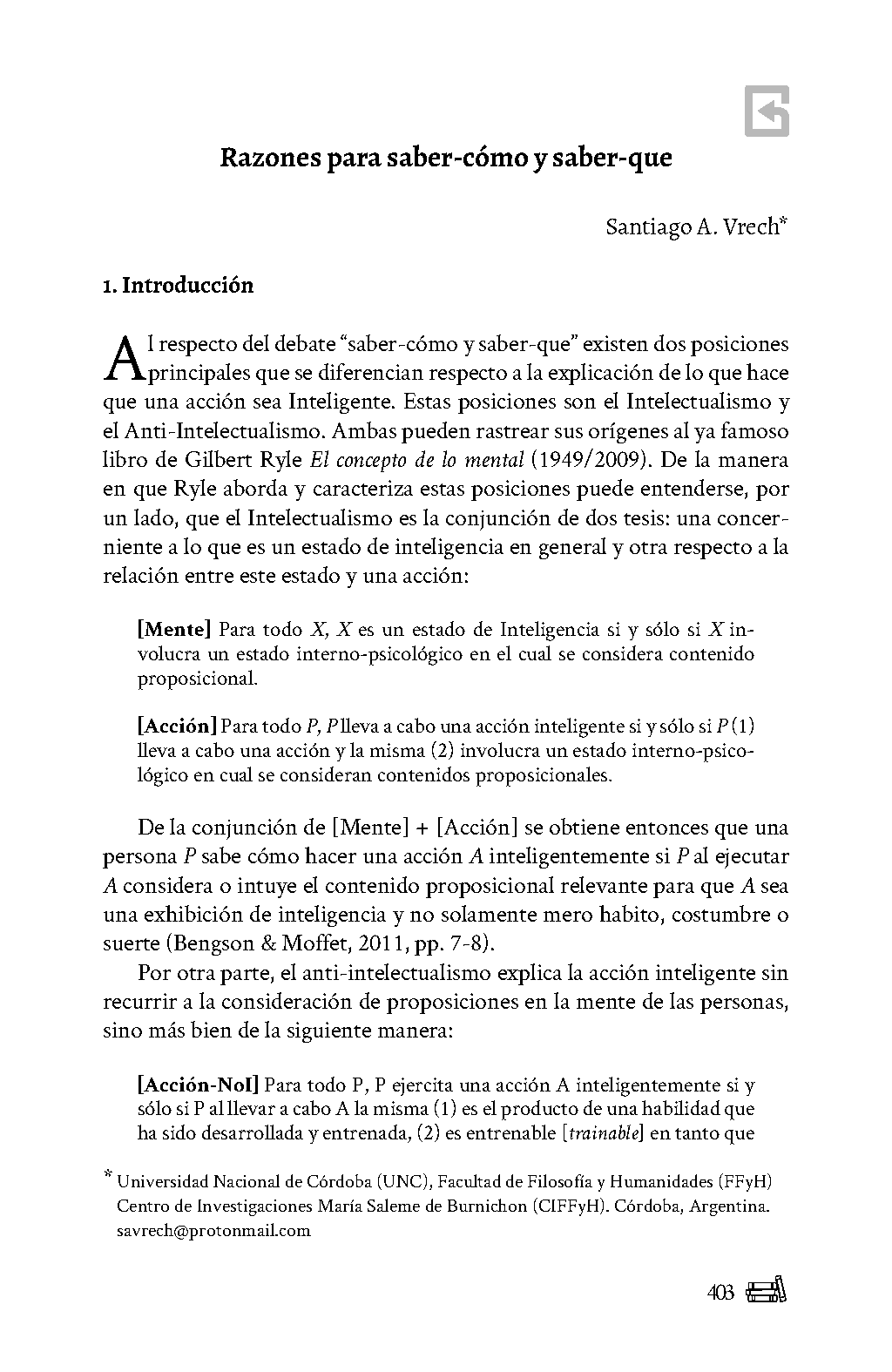Razones para saber(-cómo) y saber(-que)
Contenido principal del artículo
Resumen
En el debate “saber-que/saber-cómo” los Intelectualistas argumentan que el saber-cómo es reducible a (un tipo de) saber-que. En este trabajo desarrollaré un argumento que muestra que una de las consecuencias de adoptar esta tesis lleva a una paradoja lingüística sobre la atribución del verbo ‘saber’.
Detalles del artículo
Sección

Esta obra está bajo una licencia internacional Creative Commons Atribución-NoComercial-SinDerivadas 4.0.
- Los autores/as conservarán sus derechos de autor y garantizarán a la revista el derecho de primera publicación de su obra, el cual estará simultáneamente sujeto a la Licencia de reconocimiento de Creative Commons que permite a terceros compartir la obra, siempre que se indique su autor y su primera publicación en esta revista.
- Los autores/as podrán adoptar otros acuerdos de licencia no exclusiva de distribución de la versión de la obra publicada (p. ej.: depositarla en un archivo digital institucional o publicarla en un volumen monográfico), siempre que se indique la publicación inicial en esta revista.
- Se permite y recomienda a los autores/as difundir su obra a través de Internet (p. ej.: en archivos digitales institucionales o en su página web) antes y durante el proceso de envío.
Cómo citar
Referencias
Alston, W. P. (1986). Internalism and externalism in epistemology. Philosophical Topics (14)1, 179-221.
Bengson, J., & Moffett, M. (2011). Two conceptions of mind and action: Knowledge how and the philosophical theory of intelligence. En J. Bengson & M. Moffett (Eds.), Knowing How: Essays on knowledge, mind, and action (pp. 3-55). Oxford: Oxford University Press.
Cath, J. (2019). Knowing how. Analysis, 79(3), 487-503.
Dretske, F. (1985). Precis of knowledge and the flow of information. En
H. Kornblith (Ed.), Naturalizing epistemology (pp. 169-187). Cambridge, MA: MIT Press.
Gettier, E. L. (1963). Is justified true belief knowledge? Analysis, 23(6), 121-123.
Ginet, C. (1998). The general conditions of knowledge: Justification. En L. Alcoff (Ed.), Epistemology: The big questions (pp. 79-89). Blackwell: London.
Ichikawa, J. J., & Setup, M. (2014). The analysis of knowledge. En E. Zalta (Ed.), The Standford encyclopedia of philosophy (Spring 2014 edition). Recuperado de https://plato.stanford.edu/archives/spr2014/entries/knowledge-analysis/
Ryle, G. (2009). The concept of mind. London: Routledge. (Obra original de 1949)
Sellars, W. (1997). Empiricism and the philosophy of mind: with an introduction by Richard Rorty and a study guide by Robert Brandom (R. Brandom, Ed.). Cambridge, MA: Harvard University Press. (Obra original de 1956)
Snowdon, P. (2003). Knowing how and knowing that: A distinction reconsidered. Proceedings of the Aristotelian Society, 104(1), 1-29.
Stanley, J., & Williamson, T. (2001). Knowing how. The Journal of Philosophy, 98(8), 411-444.

